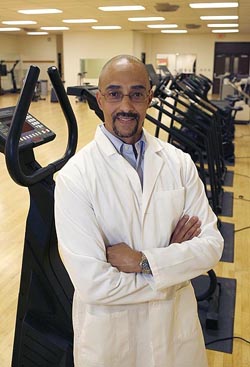|
As the world turns its attention to Beijing this summer for the Olympic Games, thousands of athletes are preparing for the event of their lives. At Temple University’s Health Sciences Center, several experts are available to comment on the mindset of Olympic athletes, their performance, causes and treatments of injuries that may occur, and the war on doping.
|
|
|
Doping and athletes
The war against doping at the Beijing Olympics promises to be intense, and drug testing has become quite sophisticated. But David Baron, D.O., warns that policing alone won't work.
"We can't focus solely on testing and catching athletes using drugs, we must also educate athletes, trainers and coaches about how drugs affect the body physically and emotionally," said Baron, professor and chair of psychiatry and behavioral science at Temple University School of Medicine and Hospital, and chair of the sports section for the World Psychiatric Association with the Beijing Olympic Committee.
Baron is part of a team that will be running doping education and the mental health clinic in the Olympic Village. He's a veteran of six Olympic Games, having served as a doping control officer and a psychiatrist for the athletes.
"Doping is a behavior and a lot of the side effects are psychiatric. Our interest lies in what motivates athletes to use drugs and how we can intervene," he said.
|
| |
|
|
The problem extends to the larger population too. Baron is concerned about the messages that young athletes are getting about performance-enhancing drugs.
"My fear is that kids are interpreting doping among elite athletes as the only way to be the best, to achieve that level of performance," he said. "I tell athletes that their advantage over a competitor is often all in the mind. It doesn't have to come from a drug."
Dr. Baron can be reached at 215-620-5358 or dbaron@temple.edu, or through News Communications at 215-707-0730.
|
| |
|
Injuries of the foot, ankle and knee
Howard Palamarchuk, D.P.M., director of the sports medicine program at Temple University’s School of Podiatric Medicine, is an expert on injuries of the foot, ankle and knee. A former Olympic-class race walker, Palamarchuk knows firsthand the strain that running, walking and jumping can have on the lower extremities.
"A universal complaint among the athletes this year has been the choice of pavement materials for the long-distance courses [in Beijing],” Palamarchuk said. “Most are made of cast concrete pavement stones — like the ones used on American driveways. It has tremendous impact on the bones of the feet and legs."
He adds that the legs, feet and ankles bear up to one million pounds of pressure during one hour of strenuous activity, and athletes can be sidelined by bone fractures, torn or stretched ligaments and tendons, arch ankle sprains, shin splints, sores and blisters.
Dr. Palamarchuk can be reached at 215-625-5389 or hpalamarchuk@comcast.net, or through News Communications at 215-707-1583.
|
Jeanne Lockner/Temple University School of Podiatric Medicine
|
| |
Photo by Joseph V. Labolito/Temple University
|
Inside the mind of the athlete
Mentally preparing for the Olympics is just as important as physical training, says Michael Sachs, Ph.D., a kinesiology professor at Temple’s College of Health Professions.
"There are a number of factors that athletes have to prepare themselves for, especially those who have never been to the Olympics before,” Sachs said. “There is tremendous opportunity for distraction; you’re in a new country, interacting with athletes from different disciplines and from countries all over the world. Some countries will go so far as to sequester their athletes so there’s no chance for distraction."
Sachs notes that some of the smaller countries tend to place more emphasis on their athletes’ performance than larger countries might.
"It’s a question of pride. For someone from Sweden, to win the gold means a lifetime of fame — he’ll be a national hero. But if that same person doesn’t do as well, they could carry that with them for a long time."
|
|
The United States will send a group of sports psychologists to counsel American athletes on any number of problems. Sachs says they could range from relationship issues to family problems to illness or injury.
"The main thing is to get the athletes back to being focused on the event," he said. "All the other little things will still be there after, but for right now, this one event is all that matters."
Dr. Sachs can be reached at 215-204-8718, or michael.sachs@temple.edu, or through News Communications at 215-707-1583.
|
| |
|
Performance detractors
Athletes prepare and train for the Olympics by stressing sameness explains Michael Brown, Ph.D., associate professor of kinesiology and exercise physiologist at Temple’s College of Health Professions.
"Athletes thrive on routine, so coaches will work to maintain their athlete’s sleep patterns, training patterns and eating habits," he said.
Brown says several factors could affect the performance of an athlete — for instance, the time change.
"Athletes are used to training for events at certain times, but now they have to perform 12 hours earlier than they normally would. So their coaches must arrange for early arrival and adequate time to reset their biological clocks."
He adds that the pollution in Beijing could affect the performance of some of the distance runners and swimmers.
"Smog has been a growing concern of many of the athletes, and has caused one athlete in particular [Ethiopian distance
|
Photo by Joseph V. Labolito/Temple University
|
|
runner Haile Gebrselassie] to refuse to participate in his standout event, the marathon," he said.
Dr. Brown can be reached at 215-204-5218 or brownmd@temple.edu, or through News Communications at 215-707-1583.
|



